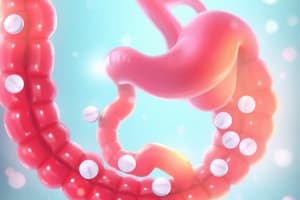Podcast
Questions and Answers
How do laxatives impact the pharmacologic effect of poorly absorbed oral preparations?
How do laxatives impact the pharmacologic effect of poorly absorbed oral preparations?
- Increase the effect (correct)
- Neutralize the effect
- Have no impact on the effect
- Decrease the effect
Which drug is known for causing evacuation of the bowels within 8 to 10 hours?
Which drug is known for causing evacuation of the bowels within 8 to 10 hours?
- Senna (correct)
- Magnesium hydroxide
- Bisacodyl
- Castor oil
Lubiprostone is associated with tolerance and dependency in patients.
Lubiprostone is associated with tolerance and dependency in patients.
False (B)
What do chloride channel activators like Lubiprostone do to increase fluid secretion in the intestinal lumen?
What do chloride channel activators like Lubiprostone do to increase fluid secretion in the intestinal lumen?
Adsorbent agents like aluminum hydroxide are used to control ________.
Adsorbent agents like aluminum hydroxide are used to control ________.
Flashcards are hidden until you start studying
Study Notes
Laxatives
- Laxatives are used to accelerate the movement of food through the GI tract, treating constipation
- Classification of laxatives is based on their mechanism of action
- Risks of laxatives include:
- Loss of pharmacologic effect of poorly absorbed, delayed-acting, and extended-release oral preparations
- Electrolyte imbalances with chronic use
- Dependency risk for the user
Types of Laxatives
- Purgatives: stronger than laxatives, used for full cleaning of the GI tract, e.g., in radiological and endoscopic procedures
- Irritants and Stimulants:
- Senna: a widely used stimulant laxative, causes evacuation of the bowels within 8-10 hours
- Bisacodyl: a potent stimulant of the colon, available as suppositories and enteric-coated tablets
- Castor oil: broken down in the small intestine to ricinoleic acid, irritating the stomach and increasing peristalsis
- Saline and Osmotic Laxatives:
- Saline cathartics, e.g., magnesium citrate and magnesium hydroxide, hold water in the intestine by osmosis
- Electrolyte solutions containing polyethylene glycol (PEG) used for colonic lavage and as an oral laxative
- Lactulose: a semisynthetic disaccharide sugar, acting as an osmotic laxative, also used for hepatic encephalopathy treatment
- Stool Softeners:
- Emollient laxatives or surfactants, e.g., docusate sodium and docusate calcium, produce softer feces and ease passage
- Lubricant Laxatives:
- Mineral oil and glycerin suppositories facilitate the passage of hard stools
- Chloride Channel Activators:
- Lubiprostone: increases fluid secretion in the intestinal lumen, easing stool passage with minimal electrolyte imbalance and no tolerance or dependency issues
Antidiarrheals
- Major Factors in Diarrhea:
- Increased motility of the GI tract
- Decreased absorption of fluid
- Antidiarrheal Drugs:
- Antimotility Agents:
- Diphenoxylate and Loperamide: opioid-like actions on the gut, inhibit acetylcholine release and decrease peristalsis
- Adsorbents:
- Aluminum hydroxide and methylcellulose: adsorb intestinal toxins or microorganisms and/or coat or protect the intestinal mucosa
- Agents that Modify Fluid and Electrolyte Transport:
- Bismuth subsalicylate: decreases fluid secretion in the bowel, used for traveler's diarrhea
- Antimotility Agents:
Studying That Suits You
Use AI to generate personalized quizzes and flashcards to suit your learning preferences.




